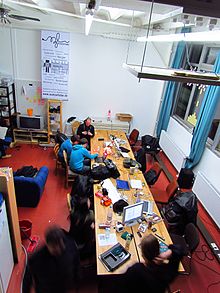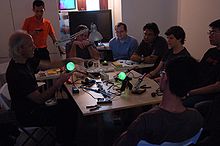- Hackerspace
-
 A German hackerspace (RaumZeitLabor)
A German hackerspace (RaumZeitLabor)
A hackerspace or hackspace (also referred to as a hacklab, makerspace or creative space) is a location where people with common interests, often in computers, technology, science, or digital or electronic art (but also in many other realms) can meet, socialise and/or collaborate. Hackerspaces can be viewed as open community labs incorporating elements of machine shops, workshops and/or studios where hackers can come together to share resources and knowledge to build and make things.[1]
Many hackerspaces participate in the use and development of free software, open hardware, and alternative media. They are often physically located in infoshops, social centers, adult education centers, or on university campuses, but may relocate to industrial or warehouse space when they need more room.
Contents
Functions
 A workshop at HackerspaceSG in Singapore
A workshop at HackerspaceSG in Singapore
The specific activities that take place at hackerspaces vary from place to place. In general, hackerspaces function as centers for peer learning and knowledge sharing, in the form of workshops, presentations, and lectures. They usually also offer social activities for their members, such as game nights and parties. They typically provide space for members to work on their individual projects, or to collaborate on group projects with other members. Hackerspaces may also operate computer tool lending libraries,[2] or physical tool lending libraries.
The building or facility the hackerspace occupies is important, because it provides physical infrastructure that members need to complete their projects. In addition to space, most hackerspaces provide electrical power, computer servers and networking with Internet connectivity. Well-equipped hackerspaces may provide machine tools, audio equipment, video projectors, game consoles, electronic instrumentation (such as oscilloscopes and signal generators), electronic components and raw materials for hacking, and various other tools for electronics fabrication and building things.[3] Some hackerspaces provide food storage and food preparation equipment, and may teach courses in basic or advanced cooking. Tools and material for sewing, craft, and art are also important at many hackerspaces.
Organization
The individual character of a hackerspace is determined by its members. Many hackerspaces are governed by elected boards selected by active members in good standing. Elected officers may serve predetermined terms, and help direct decisionmaking with regards to purchasing new equipment, recruiting new members, formulating policy, conforming to safety requirements, and other administrative issues.
Membership fees are usually the main income of a hackerspace, but some also accept external sponsors. Some hackerspaces in the US have 501(c)3 status (or the equivalent in their jurisdiction), while others have chosen to forgo tax exempt status.[4] University-affiliated hackerspaces often do not charge an explicit fee, but are generally limited to students, staff, or alumni, although guests from other hackerspaces are usually welcome to visit. Some hackerspaces accept volunteer labor in lieu of membership fees, especially from financially-limited participants.
There is a loose, informal tradition at many hackerspaces of welcoming visitors from other similar organizations, whether across town or internationally. Free exchange of ideas, skills, and knowledge are encouraged, especially at periodic gatherings sometimes called "build nights" or "open house days".
Criticism
In 2009 there was a debate about inclusionism and exclusionism within the hackerspaces community, Johannes Grenzfurthner and Frank Apunkt Schneider released a critical pamphlet about this struggle.[5] The discussion is still ongoing.
Notable hackerspaces
The wiki maintained by Hackerspaces.org (see #External links) includes an extensive and up-to-date listing of hackerspaces worldwide. Some better-known examples of hackerspaces are:
- C-base in Berlin
- The Cowtown Computer Congress in Kansas City[6]
- Cyberpipe in Ljubljana, Slovenia
- HacDC in Washington, DC[7]
- Hacker Dojo in Mountain View, California
- i3Detroit in Detroit, MI
- Site 3 coLab[8] in Toronto, ON
- Metalab in Vienna, Austria
- Metrix Create:Space[9] in Seattle, USA
- Garoa[10] in São Paulo, Brazil
- Noisebridge in San Francisco[11]
- NYC Resistor in New York City
- Null Space Labs[12] in Los Angeles
- Pumping Station One in Chicago
- PSUT Electronics and Robotics Club (PERC) in Amman , Jordan
- TOG in Dublin, Ireland[13]
- London Hackspace in London, UK
- Makerspace[14] in Newcastle_upon_Tyne
- Hackerspace Charlotte in Charlotte, NC, US
- XinCheJian 新车间 in Shanghai, China
- Tetalab in Toulouse, France
- Le Loop in Paris, France
- Labitat[15] in Copenhagen. Denmark
- Hal9k[16] in Aalborg, Denmark.
- Tokyo Hackerspace[17] in Japan
- Hack Pittsburgh[18] in Pittsburgh, USA.
- Build Brighton Hackspace in Brighton, UK.
- VHS in Vancouver, BC, Canada
- Nottingham Hackspace[19] in Nottingham, UK
- shackspace[20] in Stuttgart, Germany.
- Black Lodge Research[21] in Redmond, USA.
- HackJam at DimSum Labs in Hong Kong, China.
See also
- Hacker (hobbyist)
- Open Hardware
References
- ^ Saini, Angela. DIY Gadgetry. BBC News. June 19, 2009.
- ^ Williams, Wyatt. Freeside Atlanta makes space for local hackers. Creative Loafing. November 30, 2009.
- ^ Roush, Wade. People Doing Strange Things With Soldering Irons: A Visit to Hackerspace. Xconomy. May 22, 2009.
- ^ Pumping Station: One about (accessed 19 February 2010)
- ^ Hacking the Spaces. Austria: Monochrom. http://www.monochrom.at/hacking-the-spaces/.
- ^ "Co-op lets area techies join forces 'Hackerspace' gives geeks room to tinker.". St Louis Post-Dispatch. 28 November 2009. http://nl.newsbank.com/nl-search/we/Archives?p_product=SL&p_theme=sl&p_action=search&p_maxdocs=200&p_topdoc=1&p_text_direct-0=12C4F32A063BA460&p_field_direct-0=document_id&p_perpage=10&p_sort=YMD_date:D&s_trackval=GooglePM.
- ^ Musgrove, Mike (April 19, 2009). "Where tinkerers take control of technology". The Washington Post.. http://www.washingtonpost.com/wp-dyn/content/article/2009/04/18/AR2009041800112.html?wpisrc=newsletter&wpisrc=newsletter.
- ^ site3.ca
- ^ metrixcreatespace.com
- ^ garoa.net.br
- ^ Tweney, Dylan (March 29, 2009). "DIY Freaks Flock to ‘Hacker Spaces’ Worldwide". Wired Magazine. http://www.wired.com/gadgetlab/2009/03/hackerspaces/.
- ^ 032.la
- ^ Antonelli, Lenny and Walsh, Jason (Friday 4 April 2009). "Hackers seek physical space outside the virtual world". The Irish Times. http://www.irishtimes.com/newspaper/finance/2009/0410/1224244348482.html.
- ^ makerspace.org.uk
- ^ labitat.dk
- ^ hal9k.dk
- ^ tokyohackerspace.org
- ^ hackpittsburgh.org
- ^ nottinghack.org.uk
- ^ shackspace.de
- ^ http://www.blacklodgeresearch.org
External links
- Hackerspaces.org, includes a comprehensive international directory of hackerspaces
- The Hackspace Foundation for UK Hackerspaces
- Hackerspaces, Members And Involvement (2010 Survey study results)
- Peer Production Communities Survey (2011 Survey study results)
- Business models for Open Hardware and Hackerspaces
Categories:- Hackerspace
- Computer clubs
- DIY culture
Wikimedia Foundation. 2010.
